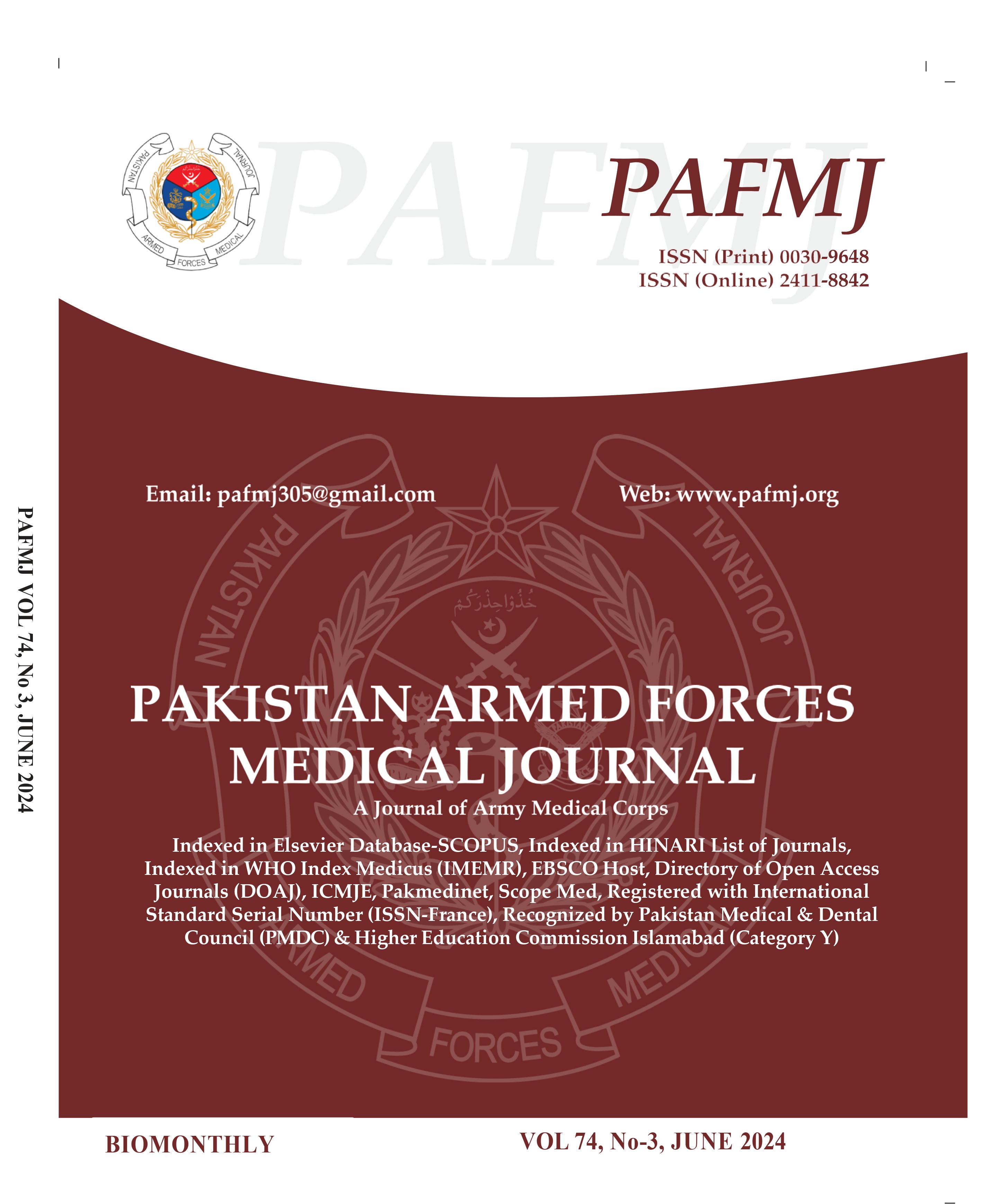Comparison of Outcome Between Early and Delayed Repair of Flexor Tendons
DOI:
https://doi.org/10.51253/pafmj.v74i3.8056Keywords:
Flexor tendon repair, Functional outcome, Laceration of flexor tendon, Surgery timingsAbstract
Objective: To determine the association of functional outcome for flexor tendon repair for the surgery timings.
Study Design: Case Series.
Place and Duration of Study: Plastic and Reconstructive Surgery Department, Dr Ruth KM Pfau Civil Hospital, Karachi Pakistan, from Apr to Sep 2021.
Methodology: A total of 98 patients were equally divided into the early duration of tendon repair and the delayed duration of tendon repair. Patients were assessed to evaluate the functional outcome of flexor tendon repair in terms of tendon power assessed by the MRC scale, active movement at joints and the incidence of rupture. Functional outcome was assessed as Excellent (75-100), Good (50-74), Fair (24-49) and Poor (0-24).
Results: In early repair, tendon power on the second post-operative day was observed as 11(22%) patients had movement against gravity but were powerless than normal, and 39(78%) patients had maximum strength. In comparison, in delayed repair, 5(10%) patients had movement against gravity but not against resistance, and 45(90%) patients had movement against gravity but were more powerless than normal. The active motion on the second post-operative day in early repair cases, 47(94%) patients had excellent active motion, while 30(60%) patients had good active motion in delayed repair. The tendon rupture was found 4(8%) in early repair and 10(20%) in delayed repair.
Conclusion: Early tendon repair had excellent active motion and a lower ratio of tendon rupture than delayed repair.
Downloads
References
Schieber MH, Santello M. Hand function: peripheral and central constraints on performance. J Appl Physiol 2004; 96(6): 2293-2300. https://doi.org/10.1152/japplphysiol.01063.2003
Mehdi Nasab SA, Sarrafan N, Saeidian SR, Emami H. Functional outcome of flexor tendon repair of the hand at Zone 5 and post operative early mobilization of the fingers. Pak J Med Sci 2013; 29(1): 43-46. https://doi.org/10.12669/pjms.291.2563
Wong JKF, Peck F. Improving results of flexor tendon repair and rehabilitation. Plast Reconstr Surg 2014; 134(6): 913e-925e.
https://doi.org/10.1097/PRS.0000000000000749
Klifto CS, Capo JT, Sapienza A, Yang SS, Paksima N. Flexor Tendon Injuries. J Am Acad Orthop Surg 2018; 26(2): e26-e35.
https://doi.org/10.5435/JAAOS-D-16-00316
Strickland JW. The scientific basis for advances in flexor tendon surgery. J Hand Ther 2005; 18(2): 94-110.
https://doi.org/10.1197/j.jht.2005.01.013
Gelberman RH, Boyer MI, Brodt MD, Winters SC, Silva MJ. The effect of gap formation at the repair site on the strength and excursion of intrasynovial flexor tendons. An experimental study on the early stages of tendon-healing in dogs. J Bone Joint Surg Am 1999; 81(7): 975-982.
https://doi.org/10.2106/00004623-199907000-00010
Griffin M, Hindocha S, Jordan D, Saleh M, Khan W. An overview of the management of flexor tendon injuries. Open Orthop J 2012; 6: 28-35.
https://doi.org/10.2174/1874325001206010028
Khor WS, Langer MF, Wong R, Zhou R, Peck F, Wong JKF, et al. Improving Outcomes in Tendon Repair: A Critical Look at the Evidence for Flexor Tendon Repair and Rehabilitation. Plast Reconstr Surg 2016; 138(6): 1045e-1058e.
https://doi.org/10.1097/PRS.0000000000002769
Yoneda S, Okubo H, Linderman SW, Kusano N, Silva MJ, Thomopoulos S, et al. The effect of modified locking methods and suture materials on Zone II flexor tendon repair-An ex vivo study. PLoS One 2018; 13(10): e0205121.
https://doi.org/10.1371/journal.pone.0205121
Lehfeldt M, Ray E, Sherman R. MOC-PS(SM) CME article: treatment of flexor tendon laceration. Plast Reconstr Surg 2008; 121(4 Suppl): 1-12.
https://doi.org/10.1097/01.prs.0000305927.51554
Chattopadhyay A, McGoldrick R, Umansky E, Chang J. Principles of tendon reconstruction following complex trauma of the upper limb. Semin Plast Surg 2015; 29(1): 30-39.
https://doi.org/10.1055/s-0035-1544168
Bircan C, El O, Akalin E, Bacakoglu AK, Gulbahar S, Sahin E, et al. Functional outcome in patients with zone V flexor tendon injuries. Arch Orthop Trauma Surg 2005; 125(6): 405-409. https://doi.org/10.1007/s00402-005-0815-5
Trail IA, Powell ES, Noble J. An evaluation of suture materials used in tendon surgery. J Hand Surg Br 1989; 14(4): 422-427. https://doi.org/10.1016/0266-7681_89_90160-5
Saini N, Kundnani V, Patni P, Gupta S. Outcome of early active mobilization after flexor tendons repair in zones II-V in hand. Indian J Orthop 2010; 44(3): 314-321.
https://doi.org/10.4103/0019-5413.65155
Puckett CL, Meyer VH. Results of treatment of extensive volar wrist lacerations: the spaghetti wrist. Plast Reconstr Surg 1985; 75(5): 714-721.
https://doi.org/10.1097/00006534-198505000-00018
Moriya K, Yoshizu T, Maki Y, Tsubokawa N, Narisawa H, Endo N, et al. Clinical outcomes of early active mobilization following flexor tendon repair using the six-strand technique: short- and long-term evaluations. J Hand Surg Eur Vol 2015; 40(3): 250-258.
https://doi.org/10.1177/1753193414551682
Tang JB. Outcomes and evaluation of flexor tendon repair. Hand Clin 2013; 29(2): 251-259.
https://doi.org/10.1016/j.hcl.2013.02.007
Edinburg M, Widgerow AD, Biddulph SL. Early postoperative mobilization of flexor tendon injuries using a modification of the Kleinert technique. J Hand Surg Am 1987; 12(1): 34-38.
https://doi.org/10.1016/s0363-5023(87)80157-0
Yii NW, Urban M, Elliot D. A prospective study of flexor tendon repair in zone 5. J Hand Surg Br 1998; 23(5): 642-648.
https://doi.org/10.1016/s0266-7681(98)80019-3
Stefanich RJ, Putnam MD, Peimer CA, Sherwin FS. Flexor tendon lacerations in zone V. J Hand Surg Am 1992; 17(2): 284-291. https://doi.org/10.1016/0363-5023(92)90407-g
Hung LK, Pang KW, Yeung PL, Cheung L, Wong JM, Chan P, et al. Active mobilisation after flexor tendon repair: comparison of results following injuries in zone 2 and other zones. J Orthop Surg 2005; 13(2): 158-163.
https://doi.org/10.1177/230949900501300209
Hudson DA, De Jager LT. The spaghetti wrist. Simultaneous laceration of the median and ulnar nerves with flexor tendons at the wrist. J Hand Surg Br 1993;18(2):171-173.
https://doi.org/ 10.1016/0266-7681(93)90098-z
Downloads
Published
Issue
Section
License
Copyright (c) 2024 Aiman Naseem, Faisal Akhlaq Ali, Hyder Ali, Usamah bin Waheed, Mehak Ali

This work is licensed under a Creative Commons Attribution-NonCommercial 4.0 International License.















